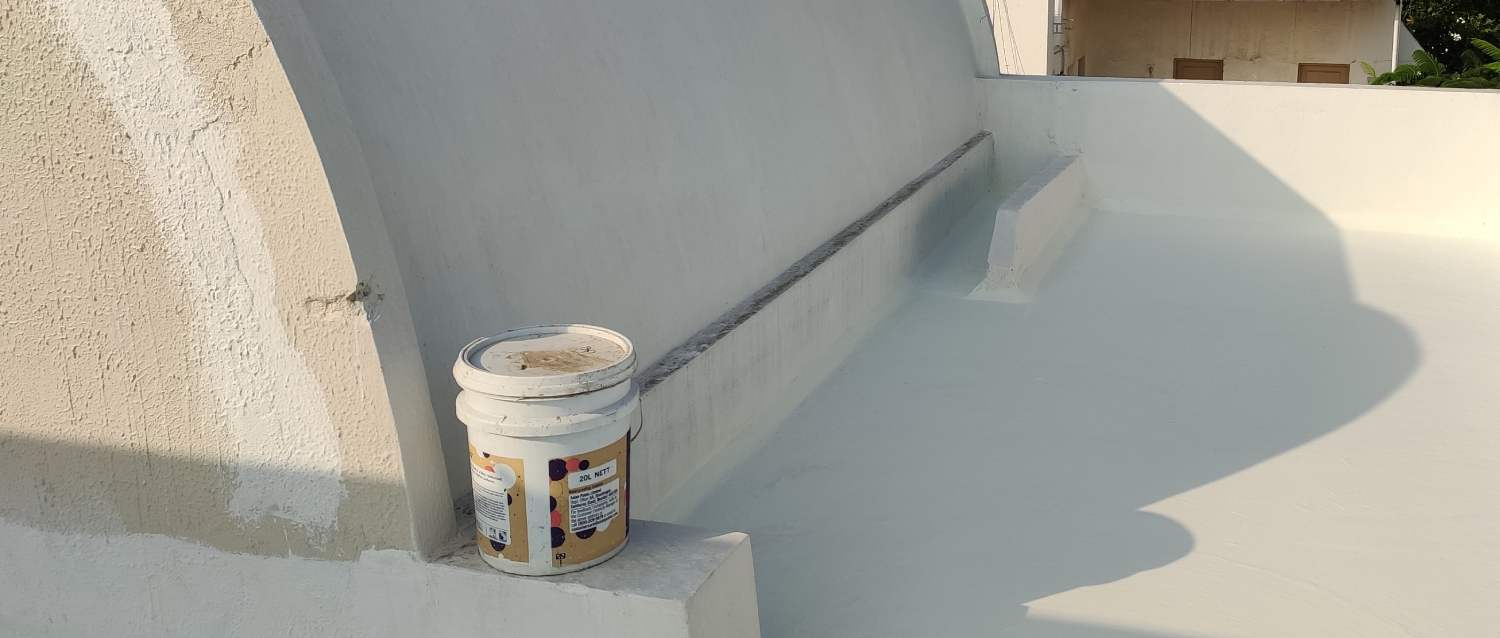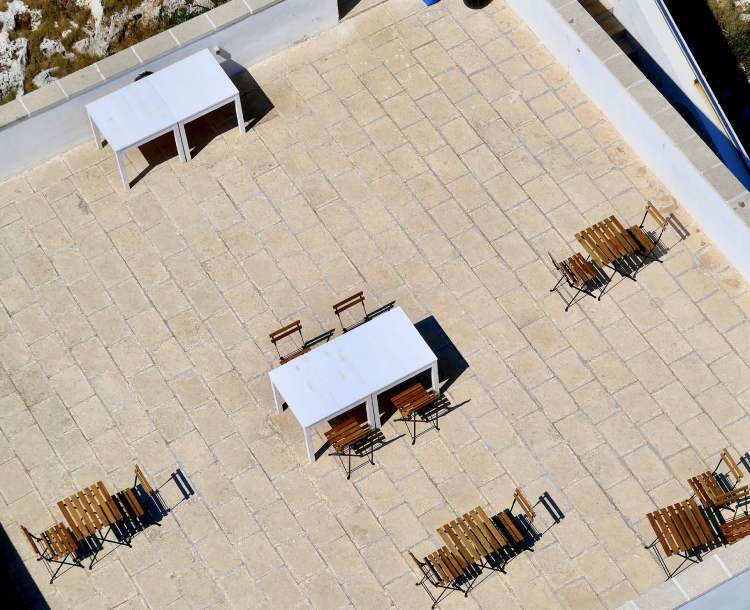
The roof is a crucial component of any building, shielding occupants from the elements and preventing water damage to the structure and everything in it. However, the roof itself needs protection from water penetration to maintain the integrity of the building.
Various roof waterproofing methods are available to safeguard your roof effectively. This blog will explore different techniques and materials used in waterproofing a roof, helping you choose the best option for your specific needs.
Materials and Methods for Waterproofing a Roof
Liquid Waterproofing Membrane
Liquid waterproofing membranes involve applying a liquid coating to the roof surface, which cures to form a seamless, rubber-like layer. They typically consist of a liquid polymer spread or sprayed onto the roof surface.
This membrane effectively seals the roof against water infiltration, protecting the building structure and interior from leaks and water damage. Its liquid application allows it to conform to different roof shapes and details, making it suitable for various roof types, including flat, pitched, and domed roofs.
Advantages:
- Seamless application prevents leaks
- Highly flexible and can cover complex roof shapes
- Easy to apply and maintain
Disadvantages:
- Requires a skilled applicator for optimal results
- May need reapplication over time
Bituminous Coating
Bituminous coating, also known as asphalt coating, is a popular method for roof waterproofing. It involves applying a sticky, tar-like substance to the roof, which creates a waterproof barrier.
Bituminous coatings are durable, resistant to weather conditions, and provide excellent protection against moisture, helping extend the roof’s lifespan. Moreover, they can be applied in liquid form, which then dries to form a solid, flexible, and waterproof membrane.
Advantages:
- Highly durable and long-lasting
- Excellent adhesion to various roof surfaces
- Cost-effective solution
Disadvantages:
- Can become brittle over time
- Requires a protective layer, such as gravel or a reflective coating, to prevent UV damage
Bituminous Membrane
Bituminous membranes are prefabricated sheets of bitumen rolled onto the roof surface. Bitumen sheets for roof waterproofing can be self-adhesive or torch applied.
The difference between bituminous membranes and bituminous roof waterproof coating is that the membranes come in rolls, which are ideal for flat roofs and large areas. They are also thicker and have a more durable layer.
On the other hand, coatings come in liquid form. That is why they are suitable for small areas and roofs with complex shapes.
Advantages:
- Provides a uniform and consistent thickness
- Highly resistant to water and weather conditions
- Easy to install, especially on flat roofs
Disadvantages:
- Requires careful handling during installation to avoid tears or punctures
- Can be less flexible than liquid membranes
Polyurethane Liquid Membrane
Polyurethane liquid membranes are a newer addition to the roof and waterproofing industry. This method involves applying a liquid polyurethane coating that cures to form a highly elastic and durable membrane.
This membrane is particularly effective for waterproofing a roof because it can adapt to the contours of the roof, providing a uniform and continuous layer that prevents leaks. Its flexibility allows it to withstand various weather conditions and movements in the building without cracking or losing adhesion.
Advantages:
- Extremely flexible and resistant to weathering
- Suitable for different roof types and conditions
- Seamless application reduces the risk of leaks
Disadvantages:
- Higher cost compared to traditional methods
- Requires professional application for best results
EPDM Rubber Membrane
EPDM (ethylene propylene diene monomer) rubber membranes are widely used for rooftop waterproofing. The synthetic rubber is highly durable and offers excellent resistance to UV radiation and weathering.
It is typically installed in large sheets that are adhered, mechanically fastened, or ballasted to the roof surface, creating a seamless and long-lasting barrier against water infiltration. EPDM rubber membranes are flexible, allowing them to withstand temperature changes and building movements.
Advantages:
- Long lifespan
- Resistant to varying temperatures and weather conditions
- Easy to repair and maintain
Disadvantages:
- Requires precise installation to avoid seams and leaks
- Can be more costly than other waterproofing methods
Cementitious Waterproofing
Cementitious waterproofing involves applying a cement-based coating to the roof surface. These materials usually have a mixture of sand, cement, and other additives that enhance their waterproofing properties.
When applied, they form a solid, durable layer that adheres well to the roof’s surface, sealing it against water intrusion. Cementitious roof waterproofing is often advantageous for roofs made of concrete or masonry.
Advantages:
- Simple application process
- Highly resistant to weathering and chemical exposure
- Cost-effective solution for concrete roofs
Disadvantages:
- Can be prone to cracking over time
- Less flexible than other waterproofing methods
Thermoplastic Membrane
Thermoplastic membranes, such as PVC (polyvinyl chloride) and TPO (thermoplastic olefin), are heat-welded onto the roof surface to create a waterproof barrier. These membranes are commonly used for commercial roofing applications.
Advantages:
- Durable and resistant to punctures and tears
- Heat-welded seams provide superior waterproofing
- Reflective surface helps reduce energy costs
Disadvantages:
- Requires specialised equipment for installation
- Higher initial cost compared to other methods

Choosing the Right Waterproofing Method
Choosing the best exterior roof waterproofing method for your roof involves assessing several critical factors to ensure you select a solution that provides lasting protection and meets your specific needs. Here are the steps to guide your decision:
Evaluate Roof Type: Determine whether your roof is flat, sloped, or curved. Remember, each type of roof has specific waterproofing needs. For example, flat roof waterproofing may require liquid-applied membranes or thermoplastic membranes, while sloped roofs might use asphalt shingles or metal roofing with waterproof underlayment.
Consider the Local Weather: In regions with heavy rainfall, you’ll need a highly waterproof material, like rubberised asphalt or PVC membranes. On the other hand, it is best to choose materials that can withstand thermal expansion and contraction in areas with extreme temperatures.
Determine Your Budget: Waterproofing costs vary widely based on the materials and methods used. That is why you must factor in the costs for the installation, long-term maintenance, and repairs. While high-quality materials might have a higher upfront cost, they often provide better durability and lower maintenance over time.
Assess the Lifespan and Maintenance Requirements: Different waterproofing systems use various materials. That is why their durability and maintenance requirements differ. So, make sure to take these things into consideration:
Environmental Impact: Some roof or rooftop waterproofing materials are more environmentally friendly than others. Reflective membranes can reduce energy costs by keeping buildings cooler, contributing to sustainability.
Professional Advice: Consult our professionals at Superior Waterproofing. We can provide insights based on your roof type, climate, and budget, ensuring you choose the most effective solution. Our team can also guarantee proper installation, which is crucial for the waterproofing system’s performance.
Protect the Roof That Protects You with Superior Waterproofing
Protecting your roof from water penetration is essential to maintaining its integrity and longevity. For expert advice and professional roof waterproofing services, contact Superior Waterproofing.
Our team of waterproofing professionals will help you choose the best waterproofing solution for your roof, ensuring long-lasting protection and peace of mind. Book your consultation today at +61468760750 and safeguard your roof with Superior Waterproofing!